How to make search and PMax campaigns complement each other
Running Search & PMax campaigns can lead to overlapping issues. Discover the pitfalls to avoid and how to achieve success.
Performance Max (PMax) and search campaigns often trip over each other and make a mess out of your data and the customer journey. But it doesn’t have to be that way.
At SMX Next, Brad Geddes, co-founder of Adalysis, dove deep into the data analysis of why you need to exert control over your search terms. He walked through the steps you can take to ensure these two campaigns aren’t fighting each other but working in tandem to improve your account performance.
The core of the conflict: PMax and Search overlap
Geddes set the stage by addressing the ongoing competition between PMax, search, and shopping campaigns:
- “Right now, the shift is PMax, search and shopping campaigns often compete with each other as opposed to complementing each other.”
This competition can lead to inefficiencies, as campaigns vie for the same search terms.
One of the central concepts Geddes introduced was Google’s “priority” system for ad displays. Google prioritizes exact-match keywords when deciding which ad to show. However, the definition of “identical” can be surprisingly stringent, Geddes said:
- “If you have this search term, ‘Italy tour guide,’ and you have the search keyword, ‘Italy tour guide,’ that’s identical. But if the search term is ‘Italian tour guide,’ it’s not identical.”
Data insights: The extent of overlap
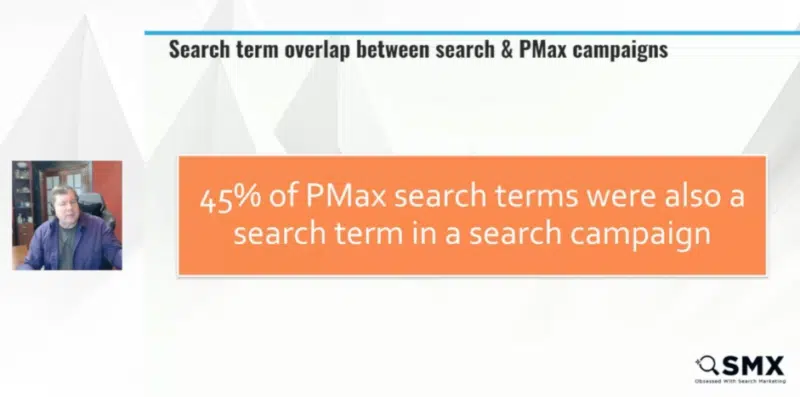
An analysis of 2,000 accounts found that 45% of PMax search terms also appeared in search campaigns, Geddes said. However, PMax often secured more impressions, showing for 61% of these shared terms. Yet, despite PMax’s dominance in impressions, Geddes emphasized:
- “Search has better click-through rates 65% of the time and better conversion rates 84% of the time.”
The problems that lead to overlap
Geddes offered actionable strategies to address this overlap, starting with keyword management.
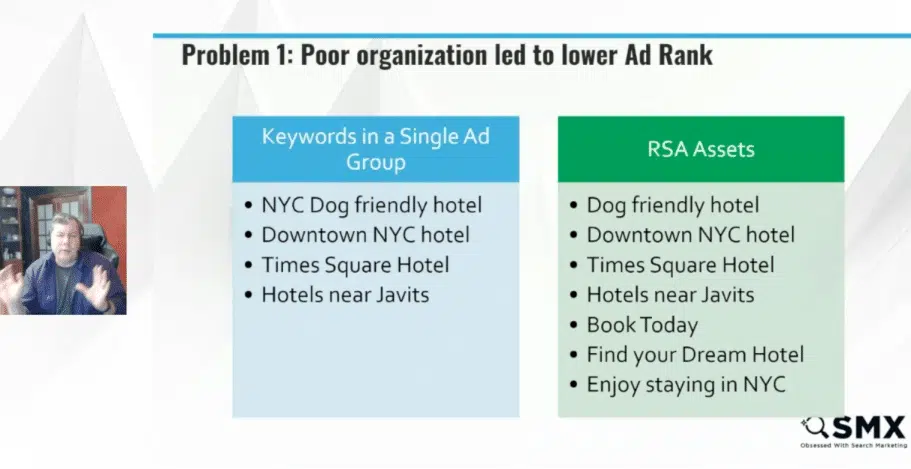
Problem 1: Poor organisation leads to lower ad rank
Poor ad group organization is a significant issue impacting ad rank and relevance in search campaigns. Geddes critiqued Google’s approach to responsive search ads (RSAs), which involves automatically mixing and matching keywords and ad assets to create ads, as it often results in mismatched messaging.
He uses the example of a New York City hotel specializing in being dog-friendly.
The hotel had an ad group with keywords like “New York City dog-friendly hotel,” expecting their RSA to display ads highlighting “dog-friendly” when users searched for those terms. However, most impressions for the keyword “NYC dog-friendly hotel” showed ads with generic phrases like “downtown New York City hotel” or “Times Square hotel,” failing to mention pet-friendliness.
The solution?
Reorganizing ad groups.
By analyzing search terms, creating more specific ad groups, and writing ads tailored to those terms, the hotel expanded from one broad ad group to around 20 focused ones. This improved the relevance of ads and tripled conversions without increasing the budget.
Evergreen ad group organization enhances relevance, quality scores, click-through rates, and conversion rates, outperforming automated approaches.
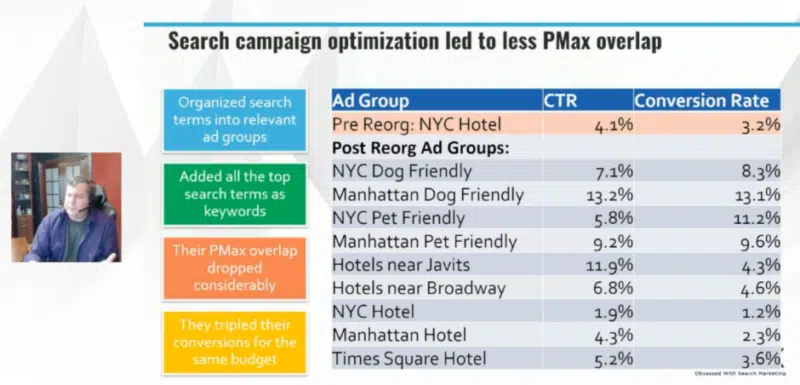
Problem 2: Not adding search terms as keywords
Our second issue in search campaign performance is tied to Google’s reliance on automation.
Google’s approach encourages marketers to use broad match keywords and automated bidding, such as CPA or maximum conversion value bidding, under the premise that Google’s system will handle the search terms effectively, Geddes said. However, he pointed out a critical flaw:
- “If you don’t manually add your top search terms as keywords, those terms won’t exist as keywords in your account.”
This prevents an exact match between the search term and keyword, leading to a scenario where PMax campaigns might take precedence over search campaigns.
The solution he offers is straightforward: marketers should still manually review and identify their top-performing search terms and add them as keywords in their search campaigns. This ensures better alignment and control, avoiding over-reliance on Google’s automation.
Problem 3: Google recommendation, removing redundant keywords
Geddes highlighted Google’s suggestion to remove “redundant keywords,” such as similar variations like Italy tour guides, Italy guided tours, and tours of Italy. Google views these as duplicates and recommends removing them.
However, if you remove these variations, you lose identical keywords in your account, allowing PMax to take priority over search campaigns, Geddes said.
Problem 4: Google auto-apply settings – turn off
Check your Auto Apply settings in Google Ads, as Google may automatically implement changes like removing redundant keywords or “non-serving keywords” (those with few or no impressions), Geddes said.
While removing non-serving keywords might seem harmless, he cautions that it can cause problems for businesses with seasonal demand.
For example, a roofing company may see fewer impressions in winter, or flower delivery keywords may drop after major holidays. If these keywords are auto-removed, they won’t be available when the next season starts, potentially leading to PMax taking over or ads not showing at all.
He emphasizes reviewing and managing Auto Apply settings to avoid unintended changes that could undermine campaign performance.
Problem 5: Ad rank preview tool
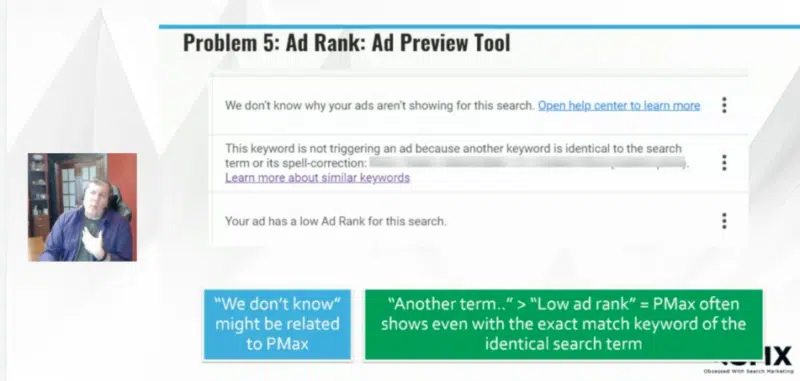
Google’s ad preview tool can provide valuable insights but has shown limitations in recent months. Geddes notes that Google often reports:
“We don’t know why your ads aren’t showing for the search,” a problem potentially linked to PMax. The tool might focus on previewing responsive search ads (RSAs), and if RSAs aren’t showing, PMax ads take over, leaving Google unable to explain why ads aren’t serving.
Another frequent issue: keywords not triggering because another “identical” keyword exists. While the system flags the duplication, the identical keyword might have low ad rank, making it ineligible to display. This allows other ads to show instead.
Pay attention to impression shares and bids, especially when low ad rank is affecting ad performance, Geddes said. This underscores the importance of monitoring how ad rank impacts eligibility and ensuring the account is well-optimized to prevent such conflicts.
Problem 6: Lost IS budget & Bid strategy
Geddes explains how using search campaigns alongside PMax campaigns can lead to conflicts if not managed carefully. In one example, an account had a structured setup where search and corresponding PMax campaigns complemented each other based on regions or products. However, problems arise when the search campaign loses impression share to budget. If the search campaign’s budget runs out, PMax takes over, shifting traffic to PMax instead of search.
To avoid this, he advises ensuring that search campaigns have minimal loss of impression share due to budget so they can compete effectively.
When impression share is lost due to rank, he suggests two solutions:
- Reduce targeting types, like having fewer keywords, to improve efficiency.
- Raise bids or improve quality scores to regain ad rank, but avoid increasing bids to the point where profitability is lost.
Geddes highlights a common issue with bid strategies: search and PMax campaigns often use different bidding methods, such as manual CPC for search and maximum conversion value for PMax. This results in different bids submitted to auctions, causing PMax to win ad rank when its bids are higher. For example, if an advertiser sets a $15 target CPA for search and a $25 target CPA for PMax, PMax can outbid search in the auction, even if search performs better.
He emphasizes that this mismatch is often a self-inflicted issue caused by inconsistent bid strategies and campaign settings, which advertisers need to address to ensure search campaigns remain competitive.
Problem 7: Campaign settings
Geddes emphasizes the importance of aligning location and scheduling settings between Search and PMax campaigns to improve performance.
Check whether both campaigns target the same regions, as discrepancies can lead to inefficiencies. For example, some companies may exclude specific areas, like Alaska, Hawaii, or California, in their Search campaigns due to shipping or regulatory reasons, but their PMax campaigns might still target those locations, or even the entire country or world.
“PMax can show for some region in this case they target different regions,” Geddes said, which can cause overlap or misalignment. Similarly, ad scheduling should also be consistent across both campaign types.
“PMax should be more restricted than Search, not more expansive,” to ensure better control and targeted performance, he suggested.
Problem 8: Misspellings aren’t the “identical” term
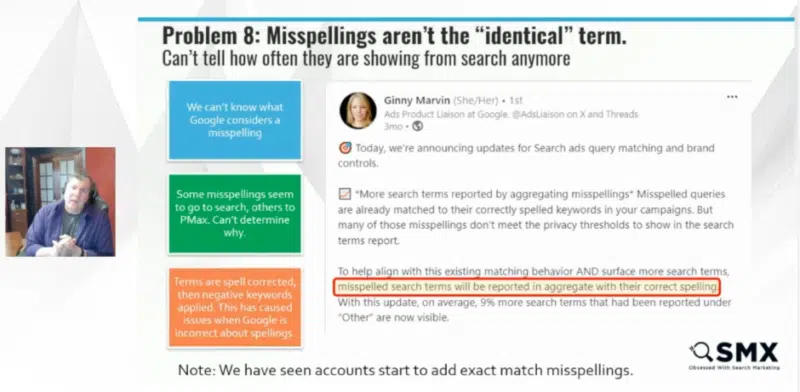
Google’s approach to search term data caused challenges, particularly the grouping of misspellings with correct spellings. While this change simplifies reporting, it creates significant issues for advertisers:
- “You can no longer tell what’s a misspelling in Google. You have no clue.”
This is problematic, especially for new brands like Airbnb or Lyft, where early misspellings dominate until Google recognizes them as valid terms.
Geddes highlighted two major concerns:
- “A, you can’t see those stats anymore. B, we don’t know how things are being corrected.”
It’s unclear if Google prioritizes correcting misspellings before applying search term logic or if corrections occur afterwards, complicating analysis and strategy.
Misspellings are a growing problem, with Google sometimes making “crazy spell corrections,” Geddes said.
As a result, some advertisers are reverting to outdated practices, such as adding exact match misspellings, which Geddes describes as “a crazy amount of work” but possibly necessary due to PMax campaigns amplifying misspelling issues.
He advises advertisers to monitor this closely:
- “It’s something that you might start watching more than you ever did before.”
- “Take your search term data, take your PMax search term data, put it in a pivot table, and look for overlaps.”
By identifying high-performing search terms, advertisers can add these as exact-match keywords in their search campaigns, ensuring better control and performance.
Another recommendation involved improving ad group organization to enhance relevance and ad rank. He shared a success story where reorganizing ad groups for a New York City hotel resulted in tripled conversions on the same budget.
- “Good ad group organization helps relevance from a quality score standpoint and improves click-through and conversion rates,” Geddes said.
Fix ad-serving issues
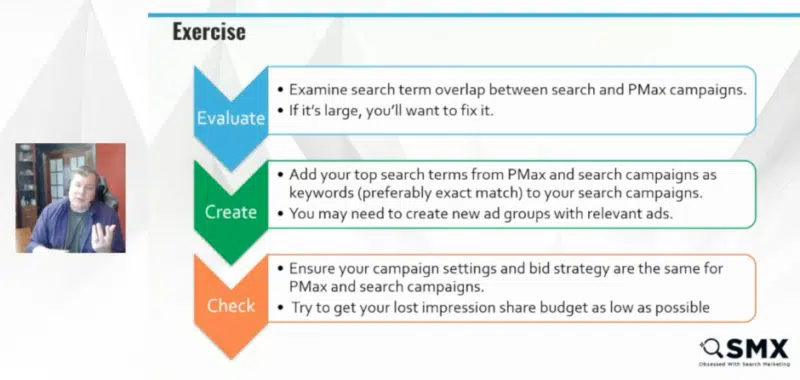
Geddes summarized the fix of these ad-serving issues into three main buckets:
- Evaluate. “Take your search term data, take your PMax search term data, put in a pivot table and look for overlaps.”
- Create. “What are our top search terms? It doesn’t matter if they’re from search campaigns or PMax campaigns. Let’s make sure those are in your search ad group – with relevant ads and landing pages.
- Check. ”Check your settings, your bid settings, your location settings, your time of day settings, your budget settings. Consistency is what we’re looking for”
Exception – Shopping Campaigns
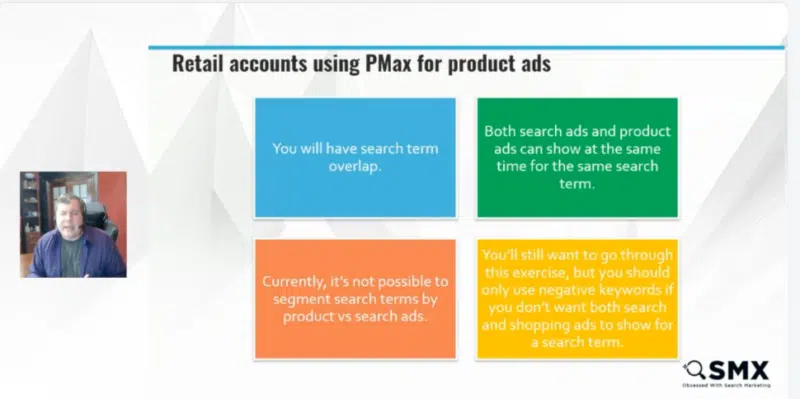
There are challenges, however in managing overlap between Search and PMax campaigns in retail, where the same search term might trigger ads from both campaigns. Geddes noted:
- “The same search term could show a search ad from search and a product ad from PMax, or PMax could show both,” which creates reporting complexity. “The reporting’s really messy.”
To address this, Geddes suggests analyzing top search terms and checking if they are included in Search campaigns. However, he cautions against broadly using negative keywords at the campaign or account level to block PMax, as this approach can complicate campaign performance.
He highlights tools like Adalysis, which help simplify this process by identifying overlaps:
- “We’ll look and say here’s your PMax search terms. Is this a keyword in Search? Is it a search term in Search?”
For example, Adalysis can analyze terms with no conversions in PMax but better performance in Search, enabling advertisers to optimize organization and performance.
Geddes advises focusing on overlap percentages and using systems that make managing negative keywords and overlaps more efficient. He mentions that Google plans to introduce campaign-level negative keywords for PMax, which will make managing overlaps easier:
- “As soon as that happens, that’ll be baked into the workflow…to make life easier.”
Looking ahead: The role of PMax
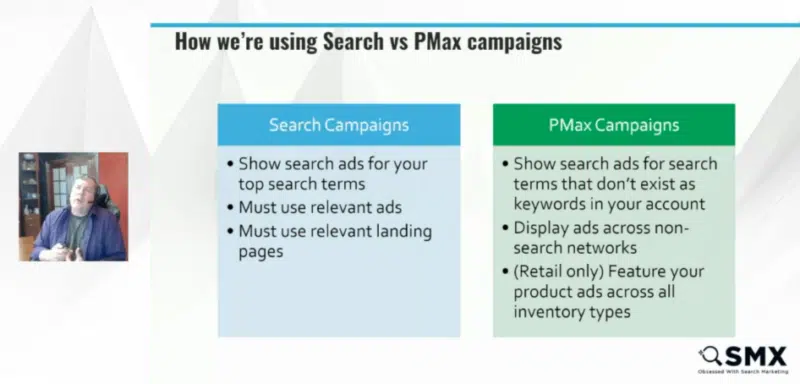
Despite its challenges, Geddes acknowledged that PMax can play a supportive role, especially for smaller accounts:
- “PMax is almost that backfill. It can be remarketing, serve across channels, and fill in the gaps for us.”
For advertisers hesitant to embrace PMax, Geddes reassured:
- “If you don’t want to try it, there’s no need to do it right now.”
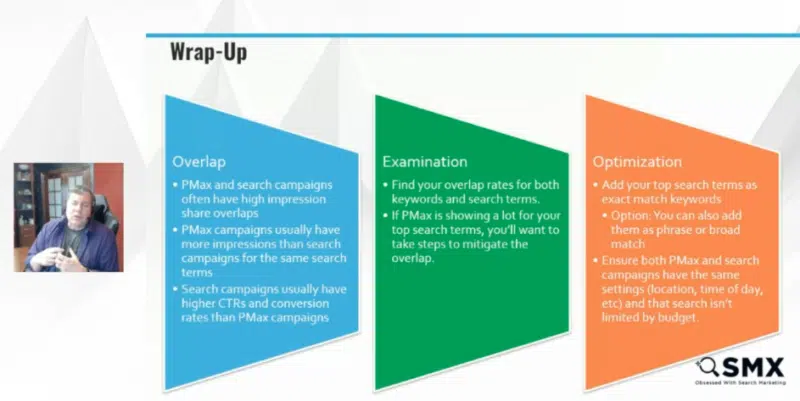
Dig deeper. Performance Max vs. Search campaigns: New data reveals substantial search term overlap
Related stories
New on Search Engine Land